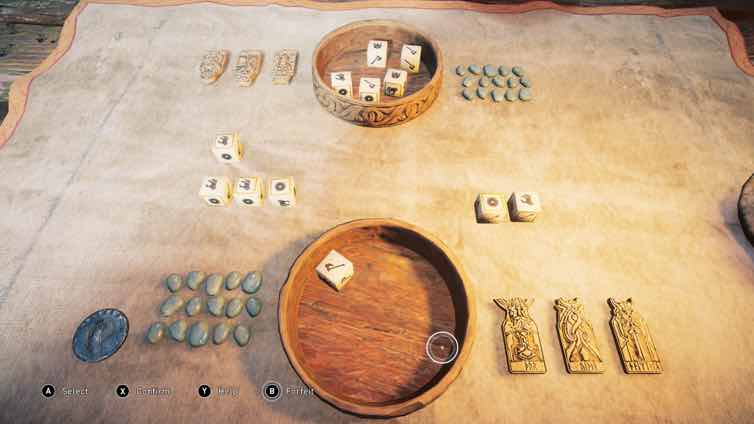
Minigames have a long tradition in video games. Assassin’s Creed games are certainly no exception, sporting their share of card games, board games, and lawn sports over the years. But Assassin’s Creed Valhalla has taken the cake with my new favorite minigame: Orlog.
Orlog is a two-player dice game the player is introduced to early in their playthrough. Armed with six dice each, you flip a coin to see who goes first. Each player has fifteen stones they must defend. If you eliminate all of the other player’s stones first, you win. Each die has an uneven combination of helmets, axes, arrows, shields, and hands. Helmets cancel out axes and shields cancel out arrows. For every unmet attack die, the other player loses a stone. Each player takes turns rolling their dice up to three times. On each roll, you can pick as many or as few of your dice to play. On the third roll, any remaining dice are automatically played.
The last element is tokens. Some sides of the dice have outlines around them. For each outlined die played, you gain a token after your rolling phase ends. For each hand played, you steal a token from the other player.
Tokens are used to redeem God Favors. These runes, each tied to a different Norse god and adorned with a different gift, make the game even less predictable and complex. After your dice-rolling phase comes your chance to attempt to use a God Favor. You pre-select these before the attacking phase. They may deal direct attacks to your opponent’s stones. They could grant extra health for each successful defense. They might grant additional arrows or negate an enemy’s shields. There are twelve total to collect, each earned in Assassin’s Creed Valhalla by defeating an Orlog player who owns it throughout the game’s vast map.
Each God Favor has three levels, each costing more tokens. The reason you select your God Favor before the attack phase is because, unless you are very quick at mental math, the number of tokens you pick up in a round may actually be fewer than you anticipated after the other player’s steals are all said and done. Deigning to use a God Favor you don’t have the adequate tokens for means no favor will be cast. You cannot switch to a lower level after making your selection. Miscalculating can mean major consequences.
The game is fairly straightforward, with few moves to make. But the uneven nature of the dice (they don’t all have the same number of each symbol) makes each roll even less predictable and harder to account for offensively or defensively. It’s a small but genius way to ensure that every turn of every round requires both chance and skill as you decide whether to play your dice or risk rolling again to see what the other player does.
The number of layers of chance also allows for numerous potential strategies. You can favor attacking dice, aiming for an all-out assault on the other’s player’s stones. You can play defensively and hope to wear your opponent out through attrition. Or, you can play to stack up tokens.
This simple yet robust minigame would be absolutely perfect for a physical release. I would buy it in a heartbeat if it meant being able to play this game with the people I am holed up with this winter. Minor tweaks to the game would have to be made, of course, such as a timer for choosing God Favors and how they are selected before the game begins. But I can just imagine the fun I would have playing this game with folks in real life.
The quick and unpredictable rounds make Orlog easy to pick up and hard to put down. With strategy nearly as complex as Risk and a concept more simple than Yahtzee, Ubisoft, please make a physical rendition of Orlog that I can buy and play at home this winter.
Assassin’s Creed Valhalla is available now on PC, Xbox One, Xbox Series X|S, PlayStation 4, and PlayStation 5






